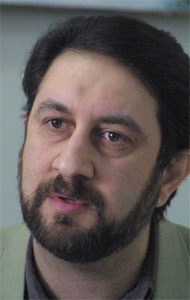The influence of US election on Iran
An interview with Dr.Hossein Salimi

Dr.Hossein Salimi, a university lecturer and expert on international relations, believes that the US elections will not have much influence on the general US strategy towards Iran but the party which the elected president belongs to will influence the US tactics on Iran.
In an interview with Baran, Salimi says there are structural currents in US system which are not dependent on the agents. In the multi-polar system of superpowers, the agents can not really influence this structure and in a bipolar system, the superpower should act as it is supposed to act, and this is not really dependent on the agents of this or that party. Anyhow, it should be noted that these agents can partially influence the formation of new structures and trends.
According to Salimi, there is a mutual interaction between agent and structure on international levels. But at the same time, there are structural factors and necessities on international and regional macro levels on which a change of actors and agents will not have much influence.
Salimi believes that any US government needs to have positive interactions with the Iranian government in order to stabilize the region. The US project of regime change in Iran does not elicit much support and it seems that a long period of pressures followed by positive interactions with Iran is the purpose that the Americans are pursuing in the region.
Salimi emphasizes that the US goal of Middle East strategic stabilization needs the resolution of Palestinian crisis, stabilization of Lebanon, Afghanistan and Iraq and in all these stages, the Iranian cooperation is needed. At the same time, Iran needs US cooperation to reach permanent regional security and to have a voice on new global economics.
Despite these factors pertaining to the necessity of Iran and US cooperation, the structural factors lead the two countries on the road to confrontation, Salimi says. Iran’s position on international system is inevitably leading it to confrontation with central powers of the international system. On the other hand, the US has defined its Middle East policies as contrary to Iran’s and this has created structural necessities leading to the two countries confrontation. The two countries’ agents have to act according to the necessities but the current situation of the Middle East leads the two countries on the way to cooperation and elimination of structural necessities.
According to Salimi, the new US government and its agents in both countries are influential in elimination of these structures because their approach to international relations can highly influence the future of relations between the two countries. In this way, the result of US presidential election will not change US general strategy towards Iran, so the next US government, whether democrat or republican, will have the same standard demands of the US government from Iran. Suspension of Uranium enrichment activities and elevation of human rights in Iran are some of them.
Salimi believes that if the Republican candidate becomes the US president, he will eventually increase the military pressures on Iran but if the Democrat candidate gets elected, he will not increase political and military pressures and instead will pursue economic pressures on Iran. In this way, if the Democrat candidate gets elected, the possibility of Iranian and US negotiation increases and the tension between the two countries will be less. Otherwise, there is the possibility of democrats’ consideration of military option.

